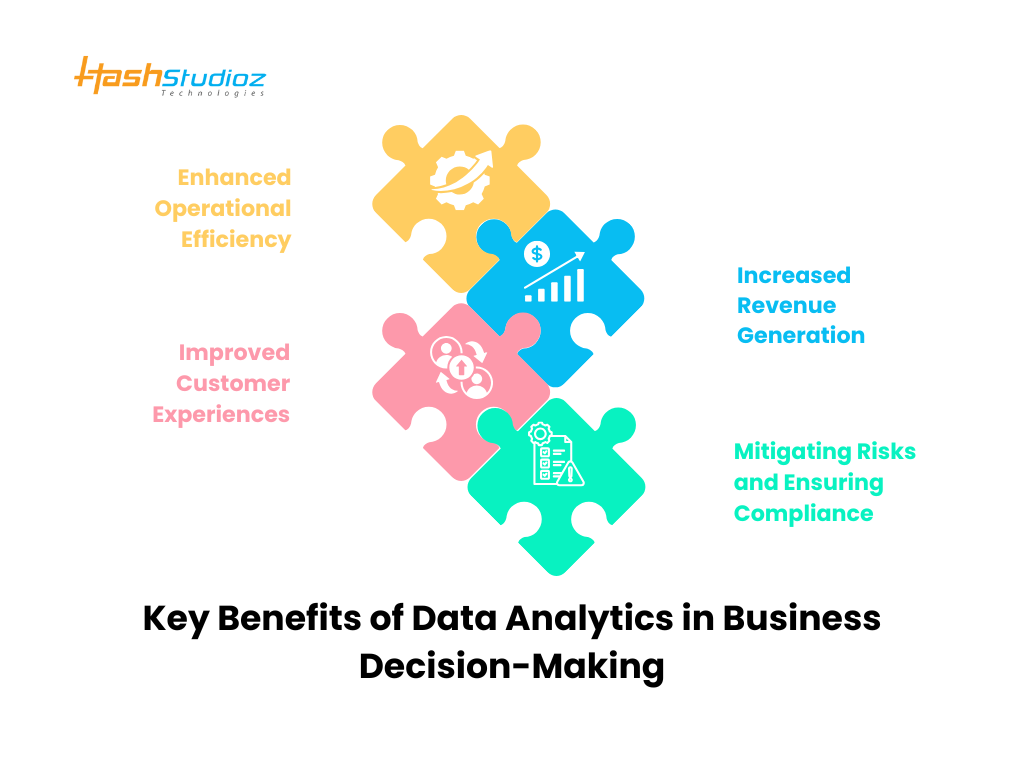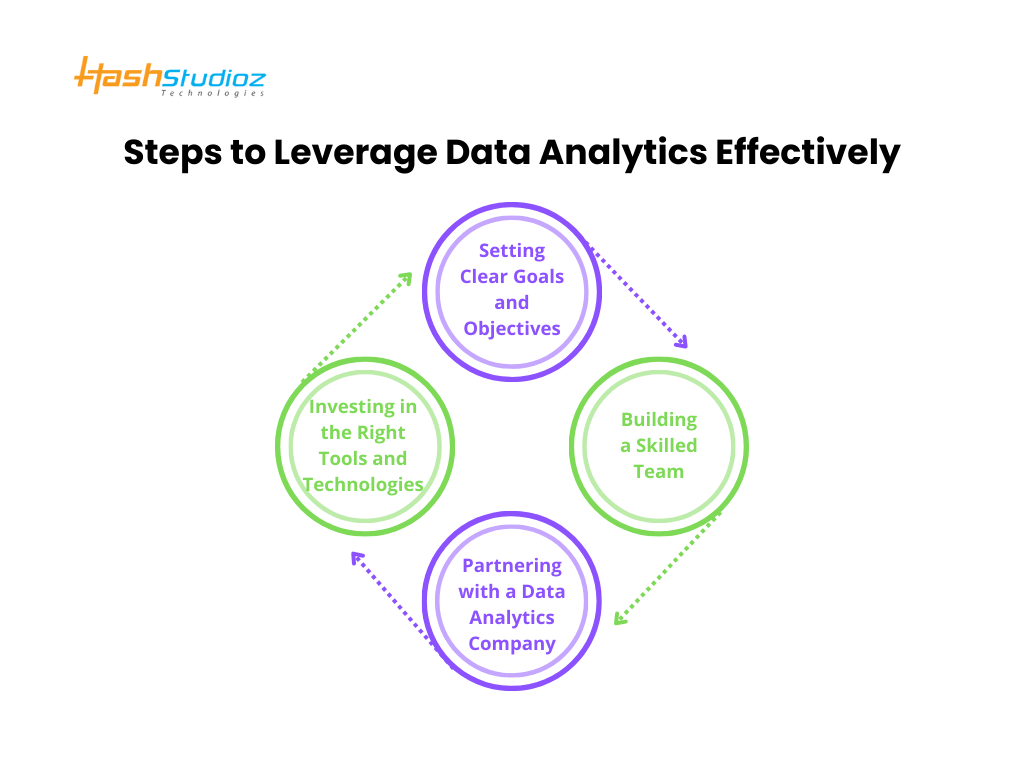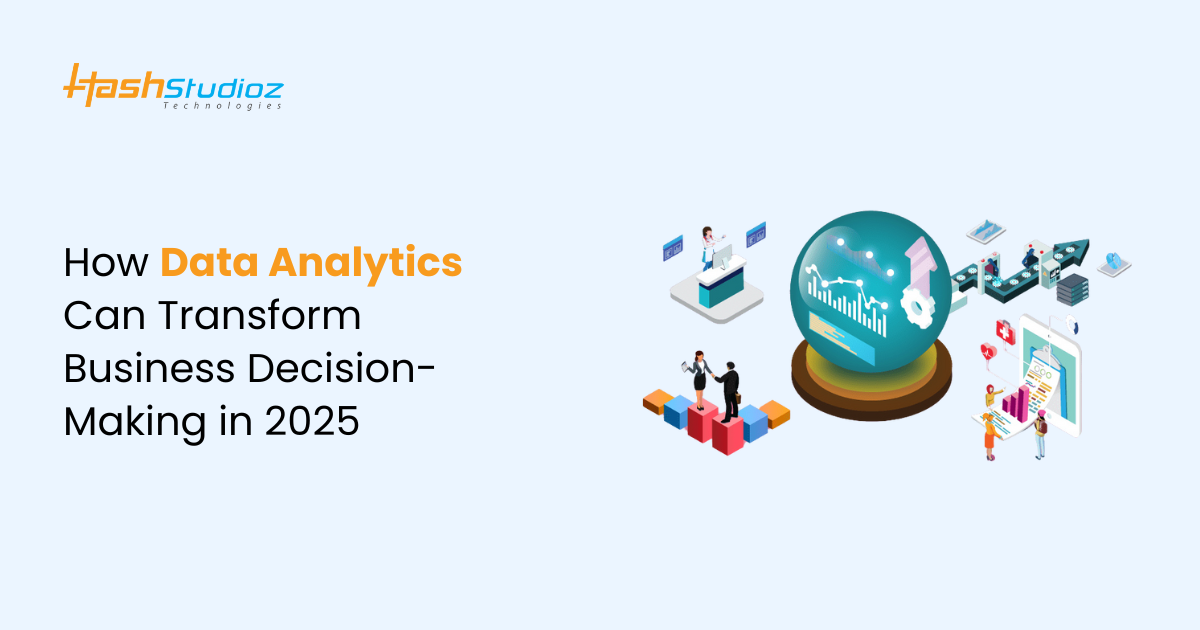In 2025, businesses are navigating a rapidly evolving landscape where data has become their most valuable asset. With the exponential growth of data sources and advancements in technology, leveraging data analytics has become indispensable for informed decision-making. Businesses that harness the power of Data Analytics Services are gaining a competitive edge by making data-driven decisions, improving efficiency, and delivering enhanced customer experiences.
- 90% of companies are investing in AI-driven analytics tools.
- Businesses using data analytics are 23% more profitable.
- 75% of organizations cite data analytics as a critical factor in their decision-making processes.
- The global market for Data Analytics Services is expected to reach $150 billion by 2025.
Table of Contents
- Understanding Data Analytics
- The Role of Data Analytics in Modern Businesses
- Key Benefits of Data Analytics in Business Decision-Making
- Emerging Trends in Data Analytics for 2025
- Steps to Leverage Data Analytics Effectively
- Why Hire Data Analysts for Your Business?
- How Data Analytics Services Companies Add Value
- Why Choose HashStudioz for Data Analytics Services?
- Conclusion
- FAQs
Understanding Data Analytics
What is Data Analytics?
Data analytics is the process of examining raw data to uncover meaningful insights, patterns, and trends. These insights are crucial for businesses to make informed decisions, optimize processes, and predict future outcomes. The field encompasses a variety of tools and techniques that help convert data into actionable intelligence.
Data analytics solutions leverage advanced technologies such as artificial intelligence (AI), machine learning (ML), and big data platforms. From understanding customer preferences to predicting market trends, the applications are endless.
The Growing Importance of Data Analytics in 2025
As businesses face increasing complexities, data analytics has emerged as a cornerstone for success. Here’s why it is pivotal in 2025:
- Data Explosion: By 2025, the volume of global data is expected to reach 180 zettabytes. Businesses need robust Data Analytics Services to process and analyze this vast amount of information.
- Competitive Edge: Companies that adopt data analytics can identify market trends faster, anticipate customer needs, and innovate effectively.
- Technological Advancements: Cutting-edge technologies such as cloud computing, IoT, and AI have made data analytics more accessible and cost-effective.
- Regulatory Compliance: Businesses need to ensure compliance with data privacy regulations like GDPR. Data analytics helps in monitoring and managing compliance effectively.
The Role of Data Analytics in Modern Businesses
Importance of Data-Driven Decision-Making
Data-driven decision-making involves the systematic use of data and analytical insights to guide business strategies and actions. By replacing intuition and guesswork with empirical evidence, businesses can achieve greater accuracy and efficiency in their decision-making processes.
Key Benefits of Data-Driven Decision-Making:
- Identifying Market Opportunities: Analytics helps businesses uncover untapped market segments, analyze consumer trends, and design strategies to capitalize on emerging opportunities.
- Optimizing Resource Allocation: By analyzing operational data, businesses can allocate resources more effectively, reduce waste, and maximize ROI.
- Enhancing Product and Service Offerings: Data-driven insights into customer preferences and behavior enable businesses to tailor their products and services to meet market demands.
Real-Time Insights and Predictive Analysis
In the fast-paced business environment of 2025, real-time analytics and predictive analysis have become critical tools for staying ahead of the curve.
Real-Time Insights:
- Provide up-to-the-minute data on operations, customer behavior, and market conditions.
- Enable businesses to respond swiftly to changes, minimizing risks and seizing opportunities.
Predictive Analysis:
Predictive analytics, powered by AI and machine learning, allows businesses to:
- Anticipate Customer Behavior: Predict purchasing patterns and preferences to personalize marketing strategies.
- Forecast Market Trends: Analyze historical data to identify future trends, aiding in strategic planning.
- Mitigate Potential Risks: Detect patterns indicative of fraud, operational bottlenecks, or other risks, enabling preemptive action.
By leveraging real-time and predictive analytics, businesses gain a competitive edge, making proactive, informed decisions that align with their goals.
Key Benefits of Data Analytics in Business Decision-Making

Enhanced Operational Efficiency
Data analytics streamlines processes by identifying bottlenecks and inefficiencies. Companies can monitor performance metrics, predict maintenance needs, and automate routine tasks to save time and resources.
Improved Customer Experiences
By analyzing customer data, businesses can:
- Personalize marketing campaigns.
- Predict customer preferences.
- Enhance service delivery.
For example, e-commerce platforms use data analytics to recommend products based on browsing history and purchase patterns.
Increased Revenue Generation
Insights from data analytics help businesses identify profitable opportunities. Predictive analytics can forecast demand trends, enabling companies to adjust pricing, inventory, and marketing strategies effectively.
Mitigating Risks and Ensuring Compliance
Data analytics plays a critical role in identifying potential risks, such as financial fraud or cybersecurity threats. Additionally, it ensures compliance with regulatory requirements by monitoring and reporting relevant metrics.
Emerging Trends in Data Analytics for 2025
Artificial Intelligence and Machine Learning Integration
AI and ML are transforming data analytics by enabling:
- Advanced pattern recognition.
- Automated decision-making.
- Enhanced predictive modeling.
Cloud-Based Data Analytics Solutions
Cloud computing offers scalable and cost-effective analytics solutions. Businesses can process vast amounts of data without investing in expensive infrastructure, ensuring accessibility and collaboration across teams.
Democratization of Data Analytics
With the rise of user-friendly tools, data analytics is no longer confined to specialists. Business users can leverage intuitive dashboards and self-service analytics platforms to access insights directly.
Steps to Leverage Data Analytics Effectively
Leveraging data analytics effectively requires a strategic and structured approach. By following these key steps, businesses can maximize the potential of data analytics and drive meaningful outcomes.

1. Setting Clear Goals and Objectives
Before implementing data analytics, it’s vital to define what you aim to achieve. Without clear objectives, efforts may become scattered and ineffective.
Action Points:
- Determine specific outcomes, such as improving customer retention, optimizing supply chain operations, or increasing sales efficiency.
- Align goals with your overall business strategy.
- Establish key performance indicators (KPIs) to measure success.
2. Building a Skilled Team
The backbone of any successful analytics initiative is a skilled and knowledgeable team.
Key Steps:
- Hire skilled data analysts: These professionals interpret data and extract actionable insights, ensuring data-driven decisions.
- Encourage cross-functional collaboration between analysts, IT teams, and business leaders.
- Invest in upskilling your team to keep them updated on the latest trends and tools in data analytics.
3. Partnering with a Data Analytics Services Company
Collaborating with a specialized Data Analytics Services Company can provide the technical expertise and resources required for large-scale or complex analytics projects.
Benefits of Partnering:
- Access to advanced tools and technologies: Service providers often use cutting-edge platforms that may not be feasible to acquire in-house.
- Expert insights and best practices: These companies bring industry-specific expertise and proven methodologies.
- Tailored solutions: They can design analytics strategies to address unique business challenges.
4. Investing in the Right Tools and Technologies
The success of data analytics initiatives depends significantly on the tools and technologies used.
How to Choose the Right Tools:
- Ensure the tools align with your analytics objectives (e.g., customer insights, operational efficiency).
- Prioritize compatibility with existing systems to avoid integration issues.
- Opt for scalable solutions that can grow with your business needs.
Popular options include cloud-based analytics platforms, predictive modeling software, and visualization tools like Tableau or Power BI.
Why Hire Data Analysts for Your Business?
Hiring data analysts is essential for businesses to thrive in today’s data-driven world. These professionals:
- Translate Raw Data into Actionable Insights: Data analysts possess the expertise to interpret complex datasets, uncovering trends, patterns, and opportunities that might otherwise go unnoticed. This allows businesses to make decisions backed by evidence rather than guesswork.
- Implement Data-Driven Strategies Effectively: Experienced analysts ensure that data insights are integrated seamlessly into business processes. This leads to optimized operations, targeted marketing campaigns, and improved customer experiences.
- Stay Competitive in a Data-Centric Market: In a world where data is a key driver of success, having dedicated analysts ensures your business stays ahead of the curve by adapting quickly to market changes and customer demands.
- Drive Growth and Innovation: Analysts help identify new growth opportunities and areas for innovation, whether it’s entering new markets, developing products, or enhancing existing offerings.
Investing in data analysts ensures your business maximizes the value of data analytics solutions, driving efficiency, growth, and success.
How Data Analytics Services Companies Add Value
A Data Analytics Services Company plays a crucial role in helping businesses harness the power of their data. These companies provide:
- Expertise in Analytics Methodologies: They bring advanced knowledge of diverse analytical techniques, including predictive, prescriptive, and diagnostic analytics, ensuring precise and actionable insights.
- Scalable, Industry-Specific Solutions: Tailored strategies and tools are designed to align with the unique needs of your industry, offering flexibility as your business grows.
- Ongoing Support and Training: These companies provide continuous assistance, from implementing analytics systems to upskilling your internal teams, ensuring seamless integration and long-term success.
Looking for a trusted partner in data analytics? Choose HashStudioz for expert guidance and customized strategies that drive success: Contact Us
Why Choose HashStudioz for Data Analytics Services?
HashStudioz stands out as a trusted technology partner, enabling businesses to unlock the true potential of their data. Here’s what makes us the ideal choice:
1. Expertise in Advanced Technologies
At HashStudioz, we leverage cutting-edge technologies to deliver actionable insights:
- Artificial Intelligence (AI) and Machine Learning (ML): Enabling predictive modeling, trend forecasting, and real-time analytics.
- Big Data Platforms: Harnessing the power of Hadoop, Spark, and cloud-based solutions for efficient data management and processing.
- Visualization Tools: Transforming complex data into intuitive dashboards using Tableau, Power BI, and other visualization platforms.
2. Tailored Solutions for Every Business
We understand that every business is unique. That’s why we offer:
- Custom Data Analytics Strategies: Designed to align with your specific industry, objectives, and growth plans.
- Scalable Solutions: Ensuring your analytics capabilities grow alongside your business.
- Industry-Specific Expertise: From retail and healthcare to logistics and finance, our experience spans diverse domains.
3. Proven Track Record of Success
With over a decade of experience, we’ve:
- Successfully completed 200+ projects for 50+ global clients.
- Helped businesses achieve measurable results, such as a 30% increase in operational efficiency and 25% growth in revenue through data-driven strategies.
4. Comprehensive End-to-End Support
From inception to implementation and beyond, we provide full-cycle data analytics support:
- Data Collection and Processing: Aggregating data from multiple sources and ensuring data quality.
- Insight Generation: Delivering precise, actionable insights tailored to your goals.
- Ongoing Support and Training: Keeping your team equipped with the latest tools and practices in analytics.
5. Client-Centric Approach
We are committed to our clients’ success. Our approach includes:
- Transparent Communication: Regular updates and clear documentation throughout the project lifecycle.
- Collaborative Problem-Solving: Working closely with your teams to ensure seamless integration of analytics solutions.
- Focus on ROI: Prioritizing initiatives that deliver tangible value and measurable returns.
By partnering with HashStudioz, you’re not just adopting data analytics—you’re empowering your business to thrive in a data-driven world. Let us help you make smarter, faster, and more impactful decisions.
Conclusion
Data analytics is no longer optional but essential for businesses aiming to thrive in 2025. From enhancing operational efficiency to improving customer experiences, its benefits are undeniable. By hiring skilled data analysts or partnering with a Data Analytics Services Company, businesses can harness the power of data to make informed decisions, mitigate risks, and achieve sustainable growth.
FAQs
1. What is the importance of data analytics in business?
Data analytics helps businesses make informed decisions, optimize processes, and improve customer experiences by uncovering actionable insights from data.
2. Why should I hire a data analyst?
A data analyst can help interpret complex data, provide actionable recommendations, and ensure your business leverages analytics effectively to drive growth.
3. How do data analytics services companies help businesses?
They offer expertise, advanced tools, and tailored solutions to address specific challenges, ensuring businesses maximize the value of their data.
4. What are the emerging trends in data analytics for 2025?
Key trends include AI and machine learning integration, cloud-based analytics, and the democratization of data analytics.
5. What industries benefit the most from data analytics?
Industries like healthcare, retail, finance, and manufacturing benefit significantly from data analytics due to its applications in operational efficiency, customer insights, and risk management.

